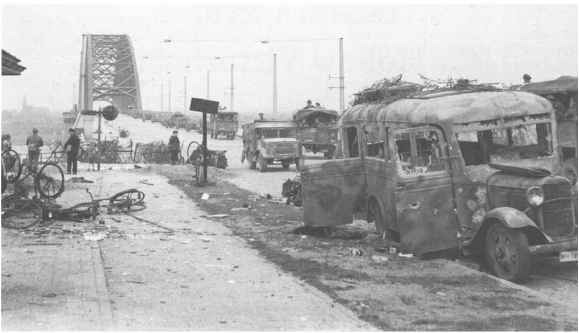
IT NEVER S N O W S IN SEPTEMBER

General Bittrich, the Commander of IISS Corps, reported at 2330hours 20 September that 'nothing [had] been heard from the Nijmegengarrison for two hours' and that he could 'only assume the Germanunits had been destroyed'. Allied units begin to cross the Nijmegenbridge. (Imperial War Museum)
'The Americans behaved as theyalways do, throwing our woundedfrom the bridge into the Waal, andshooting the few prisoners among thearmy reservists.'
4
Fighting was intense, with little quarterexpected or forthcoming. Fanatical resist-ance still continued around the commandpost of the commander of 21 Battery, SS-Captain Krueger, cut off in the Valkhofcitadel in SS 2/Lieutenant Baumgaertel'ssector. Baumgaertel survived this battle andreceived the German Cross in Gold for hisexploits, only to be killed later in Stettin.Krueger frantically rallied all theresources at his disposal, flinging the escap-ing or shell-shocked infantrymen, fromevery branch of the Wehrmacht, who came
5
his way, into the trenches that led to hisfirst-aid bunker. Bloody hand-to-handfighting raged around the position until2030, causing considerable losses to theenemy. At about 1800 Krueger waswounded in the back by a Tommy-gunburst; despite being wounded again later,he fought on, continuing to direct his bat-tery's fire from across the river with a vereypistol. Eventually a tank round exploded inthe trench injuring him severely in theupper thigh — his third wound. He wasfinally carried out of action on a stretcher,into the first-aid bunker. Only twelve menand NCOs now remained. These wereeventually driven out of the trenches withphosphorus grenades and overwhelmed in aclose-quarter struggle. Survivors were toreport the eventual outcome:
212